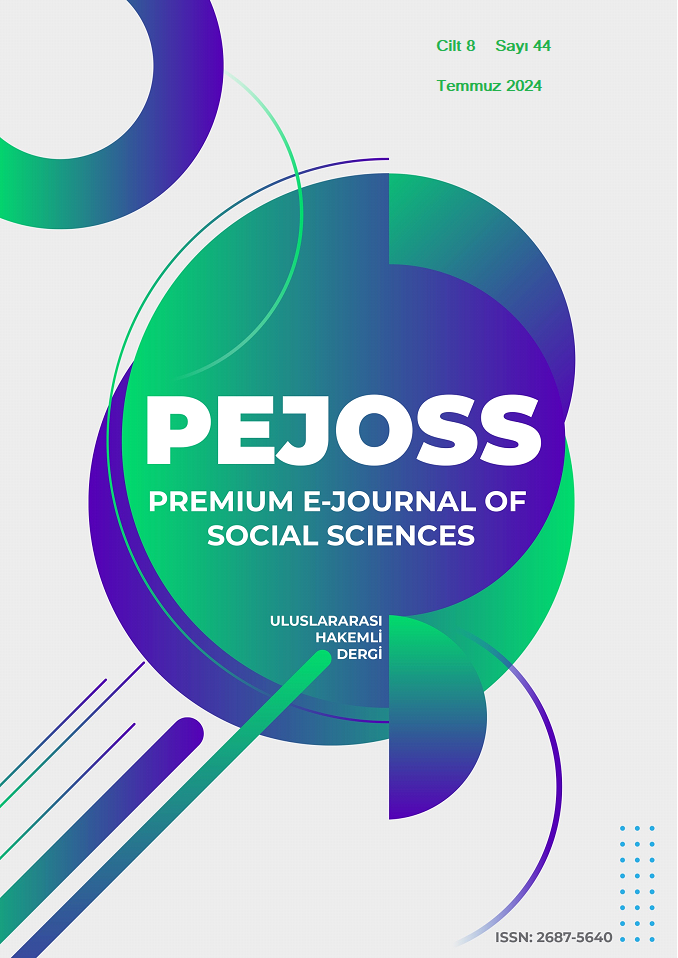A Phenomenal Study On The Problems Encountered By Refugee Students During The Education-Training Process
DOI:
https://doi.org/10.5281/zenodo.13151613Keywords:
Refugee students, education, phenomenologyAbstract
This research was planned to identify the problems encountered by refugee students during the education process. Depending on its purpose, the research was planned according to the phenomenology pattern, one of the qualitative research methods. The study group of the research consisted of 24 refugee students studying in a public secondary school selected according to the criterion sampling method. A semi-structured interview form was applied to the study group as a data collection tool. The collected data were analyzed using the content analysis method, and themes were created as a result of the analysis. As a result of the research, it was determined that most of the refugee students did not have any problems with their schoolmates and teachers, were not excluded, and did not have communication problems. It was concluded that most of the refugee students participating in the research stated that they had difficulty understanding the lessons and the biggest reason for this was the language difference. It is also seen that refugee students do not experience any reluctance to participate in class and learn.
Downloads
References
Agcadağ-Çelik, İ. (2019). Sınıf öğretmenleri gözünden suriyeli mülteci çocuklar. Journal of International Social Research, 12(66), 662-681. https://doi.org/10.17719/jisr.2019.3615.
Arı, Ş. (2010). Kuzey Kıbrıs Türk Cumhuriyeti’nde ilköğretimin ikinci kademesinde öğrenim gören yabancılara Türkçe öğretimi üzerine bir değerlendirme [Yayımlanmamış doktora tezi]. (278253), Eğitim Bilimleri Enstitüsü, Gazi Üniversitesi.
Aydın, H., & Kaya, Y. (2020). The educational needs of and barriers faced by Syrian refugee students in Turkey: A qualitative case study. Marco Catarci, Miguel Prata Gomes, Sávio Siqueira (Eds.) Refugees, interculturalism and education içinde (131-148). Routledge.
Bal, A., Cavkaytar, A., Artar, T. M., & Uluyol, M. (2021). Suriyeli Mülteci Öğrencilerin Eğitim Yaşantılarının İncelenmesi. Milli Eğitim, 50(1), 195-219. https://doi.org/10.37669/ milliegitim.934424.
Başar, M., Akan, D., & Çiftçi, M. (2018). Mülteci öğrencilerin bulunduğu sınıflarda öğrenme sürecinde karşılaşılan sorunlar. Kastamonu Eğitim Dergisi, 26(5), 1571-1578. https://doi.org/10.24106/kefdergi.427432.
Bayındır-Goularas, G. (2018). International migration in the twenty-first century: A General overview. Gökçe Bayındır Goularas, Işıl Zeynep Türkan İpek (Eds.), International Migration in the 21st Century: Problems and Solutions içinde (3-18). Cambridge Scholars Publishing.
Bolter, J. (15.03.2024). Explainer: Who Is An Immigrant?. https://www.migrationpolicy.org/sites/default/ files/Explainer-WhoIsAnImmigrant-PRINT-Final.pdf.
Börü, N., & Boyacı, A. (2016). Göçmen öğrencilerin eğitim-öğretim ortamlarında karşılaştıkları sorunlar: Eskişehir ili örneği, International Periodical for the Languages, Literature and History of Turkish or Turkic 11(14), 123-158. https://doi.org/10.7827/TurkishStudies.9818.
Creswell, J. W. (2013). Qualitative inquiry & resaerch design: Choosing among five approaches (Third edition), Sage.
Dost, S. (2021). Avrupa’ya ikinci kavimler göçü (mü?): Sorunlar, fırsatlar, tehditler, çözümler. Dokuz Eylül Üniversitesi Sosyal Bilimler Enstitüsü Dergisi, Dokuz Eylül Üniversitesi Uluslararası Konferansı, Göç: Önümüzdeki Yirmi Yılın Projeksiyonu ve Ötesi, 21(Özel Sayı), 1-21. https://doi.org/10.16953/deusosbil.1055481.
Er, A. R., & Bayındır, N. (2015). Pedagogical approaches of elementary teachers for primary refugee children. International Journal of Social and Educational Sciences, 2(4), 175-185.
Karaağaç, F. C., & Güvenç, H. (2019). Resmi ilkokullara devam eden Suriyeli mülteci öğrencilerin eğitim sorunları. OPUS International Journal of Society Researches, 11(18), 530-568. https://doi.org/10.26466/opus.530733.
Koşar, S. & Aslan, F. (2020). İlkokul ve ortaokula devam eden göçmen çocukların eğitim sorunlarına yönelik okul yöneticilerinin görüşleri. Uluslararası Türkçe Edebiyat Kültür Eğitim Dergisi, 9(4), 1799-1831.
Küçükali, R., & Çevik-Özdemir, H.N. (2018). Göç etmiş ailelerin ilköğretim çağındaki çocuklarının yaşadıkları sorunların değerlendirilmesi. Atatürk Üniversitesi Sosyal Bilimler Enstitüsü Dergisi, 22(Özel Sayı 2), 2149-2158.
Orman, D & Aydemir, İ. (2022). Geçici koruma statüsü altındaki sığınmacı çocukların karşılaştıkları güçlükler ve gereksinimleri. Uluslararası Sosyal Hizmet Araştırmaları Dergisi, 2(1), 1-13.
Özoruç, N., & Dikici-Sığırtmaç, A. (2022). Okul öncesi öğretmenlerinin mülteci çocukların eğitim sürecinde karşılaştıkları sorunlara ilişkin görüşleri. Millî Eğitim Dergisi, 51(233), 237-258.
Rakhmonov A.Kh. (2021). Education of migrant children as a contribution to Russia’s future. Управление (Upravlenie/Management), 9(3), pp. 137–146. DOI: 10.26425/2309-3633-2021-9-3-137-146
Rose, P., Beeby, J. & Parker, D. (1995). Academic rigour in the lived experience of researchers using phenomenological methods in nursing. Journal of Advanced Nursing, 21, 1123-1129. https://doi.org/10.1046/j.1365-2648.1995.21061123.x.
Sağlam, S. (2006). Türkiye'de iç göç olgusu ve kentleşme. Hacettepe Üniversitesi Türkiyat Araştırmaları (HÜTAD), (5), 33-44.
Seddighi, H., Naseh, M., Rafieifar, M., & Ilea, P. (2022). Education of Afghan refugee children in Iran: A structured review of policies. Children & Society, 1(15), 712-726. https://doi.org/10.1111/chso.12620.
Shohel, M.M.C. (2022). Education in emergencies: Challenges of providing education for Rohingya children living in refugee camps in Bangladesh. Education Inquiry, 13(1), 104-126. https://doi.org/10.1080/20004508.2020.1823121.
Solak, E. & Çelik, S. (2018). Türkiye’de eğitim gören mülteci öğrencilerin dilsel sorunlarının incelenmesi, Uluslararası Sosyal Araştırmalar Dergisi, 11(57), 425-432.
Sönmez, V., & Alacapınar, F. G. (2011). Örneklendirilmiş bilimsel araştırma yöntemleri. Anı Yayıncılık.
Strekalova, E., & Hoot, J. L. (2008). What is special about special needs of refugee children?: Guidelines for teachers. Multicultural Education, 16(1), 21-24.
Şeker, B. D., & Aslan, Z. (2015). Refugee children in the educational process: An social psychological assessment. Journal of Theoretical Educational Science, 8(1), 86-105. http://dx.doi.org/10.5578/keg.8234
Tosun, A., Yorulmaz, A., Tekin, İ., & Yildiz, K. (2018). Mülteci öğrencilerin eğitim sorunları, eğitim ve din eğitiminden beklentileri: Eskişehir örneği. Eskişehir Osmangazi Üniversitesi Sosyal Bilimler Dergisi, 19(1), 107-133. https://doi.org/10.17494/ogusbd.457087.
Turan, M. & Polat, F. (2017). Türkiye’de öğrenim gören yabancı uyruklu ilköğretim öğrencilerinin karşılaştıkları sorunlar ve çözüm önerileri. Qualitative Studies, 12(4), 31-60. http://dx.doi.org/10.12739/NWSA.2017.12.4.E0034.
U.S. Immigration Glossary (2022). Immigrant definition. https://www.usimmigration.org/ glossary/immigrant.
UNCHR (2021). What is a refugee? https://www.unhcr.org/what-is-a-refugee.html#:~:text=The% 201951%20Refugee%20Convention%20is,group%2C%20or%20political%20opinion.%E2%80%9D.
UNCHR (2024). Türkiye bilgi notu. https://www.unhcr.org/tr/wp-content/uploads/sites/14/2024/05/Bi-annual-fact-sheet-2024-02_Turkiye_FINAL-30-April-24.pdf.
Uzgöker, U., & Doğan, G. (2019). Uluslararası göç ve mülteci krizi. İstanbul: Der Kitabevi.
Yalçın, V., & Simsar, A. (2020). Adjustment of Syrian refugee children into pre-school education in Turkey. Elementary Education Online, 19(3), 1214-1224 https://doi.org/1214-1224 10.17051/ilkonline.2020.728021
Yıldırım, A., & Şimşek, H. (2021). Sosyal bilimlerde nitel araştırma yöntemleri. Seçkin Yayıncılık.
Yurdakul, A. & Tok, T. N. (2018). Öğretmen gözüyle mülteci/göçmen öğrenci, Adnan Menderes Üniversitesi Eğitim Fakültesi Eğitim Bilimleri Dergisi, 9(2), 46-58.
Zayimoğlu-Öztürk, F. Z. (2021). Eğitim Sisteminde Mülteciler: Türk ve Mülteci Öğrenci Görüşleri. Eğitim ve Bilim, 46(208), 321-348. http://dx.doi.org/10.15390/EB.2021.10439.
Downloads
Published
How to Cite
Issue
Section
License
Copyright (c) 2024 Premium e-Journal of Social Science (PEJOSS)

This work is licensed under a Creative Commons Attribution 4.0 International License.


